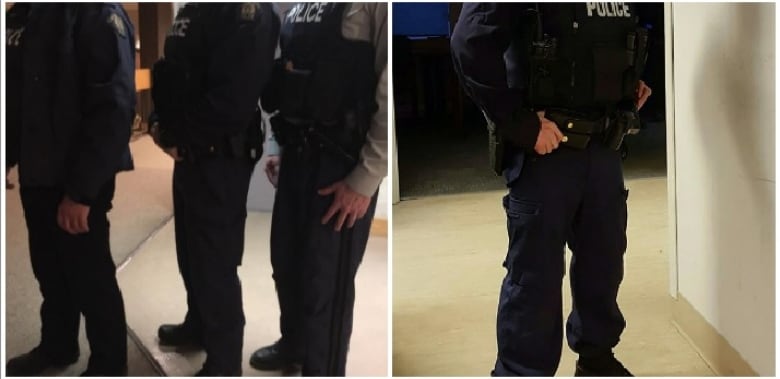RCMP yellow stripe protest over pay discrepancies spreads among officers
Criminologist calls push-back by rank and file unusual, but expects more
Sgt. Chris Backus knows that speaking out about receiving fair compensation as a Mountie could cost him his job, but he's willing to take that risk.
"I have been verbally reprimanded by the RCMP, I've been told not to speak out any further," he said a day after telling the CBC about how he and members at Sunshine Coast RCMP are covering up the yellow stripe on their uniforms.
They're calling it a symbolic protest of pay discrepancies between RCMP and municipal forces across Canada.
"I will not be silenced on this issue," said Backus. "I will continue to speak out and I accept whatever fate that gives me on a disciplinary measure."
It appears that Backus is not alone, as pictures of Mounties either taping over their yellow strip or wearing different pants are popping up on social media across the country.

"I get the sense that there will be more of this," said SFU criminology professor Rob Gordon. "You've got a disgruntled labour force there."
Protest of any kind is rare inside the RCMP, which has strict regulations about publicly expressing any kind of comments about the force that could be considered negative.
Last July, many Mounties refused to volunteer for so-called, "red serge duty," where they march in parades and other events.

Officers who participate in the yellow-stripe protest could face disciplinary action relating to its code of conduct, which could result in a verbal reprimand or even dismissal.
On Wednesday, Public Safety Canada announced retroactive salary increases for the RCMP, which include a 1.25 per cent raise effective Jan. 1, 2015, another 1.25 per cent raise effective Jan.1, 2016, and a 2.3 per cent market adjustment effective April 1, 2016.
"This package does very little in moving the RCMP into a competitive salary range to attract and to retain qualified candidates," said The National Police Federation, one of three groups in Canada trying to professionally represent the country's 17,000 members.
The force is in the process of forming a union, but no group is yet in place to represent RCMP officers in bargaining.
Some Mounties have been transitioning to municipal forces for better pay, equipment and working environments.
For example, the entry level salary for an officer with the RCMP is $50,674, while a constable with the Vancouver Police Department on probation earns $68,443.

Gordon says the long-simmering issue may be brought to a head with the yellow stripe protest.
"I think they're getting ticked off royally," he said of rank-and-file members. "And this is one way in which they can demonstrate their discontent and as I say I think there's more to come."
The head of the RCMP in B.C., Brenda Butterworth-Carr, sent a message to members asking them not to cover up the stripes.
"While I understand your disappointment on this matter, I trust you will understand why I cannot endorse such action," she wrote. "I believe an incomplete uniform undermines the distinctive role we play in keeping our citizens safe and secure."
Backus disagrees and calls the protest, "respectful and professional."
He's calling on commissioned officers, including RCMP Commissioner Bob Paulson, to take part.
'We should be united'
"This does not need to be a divisive issue between the senior members of the RCMP and the regular members," he said.
"We should be united on this front. So instead of ordering members to be quiet, instead of trying to strategize how to deal with this, you have a choice. You have a defining moment in your career and even a defining moment in your life. Why don't you take off your stripe?"
Gordon doubts commissioned officers will join in, despite saying that he's sure many of them quietly sympathize. In the end, those officers are responsible for enforcing code of conduct.
If the protest grows, which he expects it to, he says it may be up to Paulson, who will retire in June, to do something to bring members back into line.
Paulson to 'ice' protest?
"The commissioner may well issue a directive," he said. "The commissioner may well come with a bucket of ice water and try and fix this in some way."
Brian Sauvé, who is co-chair of the National Police Federation, is supportive of the protest and says it will try and help any members facing discipline over speaking out.
"We've put up and we've allowed our members to be disadvantaged for too long, whether it be resource levels, which have been abysmal or whether it be compensation tables," he said.
Meanwhile he also wants members to sign onto either his organization — which has 4,500 members — the Mounted Police Professional Association of Canada, or a similar group in Quebec to push forward a union for RCMP members.
He says, until officers get professional representation, there is no way they can move forward on negotiating better wages and benefits.
with files from Alison Crawford.
Corrections
- A previous version of this story contained an image attributed to a Vancouver Police Department Facebook page. In fact, the image was not created by the VPD.Apr 08, 2017 1:21 PM PT
